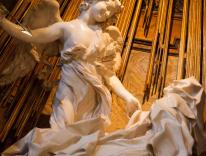Todays Gospel (ch. 9 of Johns GospelI do hope they read the whole of it) has from a very early date been associated with baptism which very early also came to be called “Illumination” or “Enlightenment.” The conversations that follow the sign of the healing of the man born blind show the young man himself gradually moving closer to the light of faith while the Pharisees become increasingly blind and earn the severe condemnation with which the story ends.The passage from Ephesians that serves as todays second reading also has baptismal resonance, particularly by its contrast between darkness and light and with what may be a verse from an early Christian baptismal hymn: “Arise, sleeper, and rise from the dead, and Christ will enlighten you.“All of this, of course, anticipating the great Easter Vigil with its powerful light-symbolism, its celebration of baptism, and its renewal of baptismal vows.St. Augustine loved these readings and used them often both to prepare people for baptism and as an instruction to the newly baptized. Here is an example:
We shall see each others hearts, but only afterwards; right now we are still carrying the darkness of mortality around with us and walking by the light of the Scriptures, just as the Apostle Peter says: “We have the more firm prophetical word, to which you do well to attend as to a light in a dark place, until the day dawns and the day star arises in your hearts” (2 Pet 1:19). Because of the faith by which we believe in God, then, by comparison with unbelievers, we are the day. While in our unbelief we too were night with them, now we are light, as the Apostle says, “You once were darkness, but now you are light in the Lord” (Eph 5:8). Darkness in yourselves, light in the Lord. Similarly, in another place, “You are all children of light, and children of the day; we are not of the night, nor of the darkness” (1 Th 5:5). “Let us walk honestly, as in the day (Rm 13:13). Light, therefore, by comparison with unbelievers.But by comparison with that day when the dead shall rise again, and “this corruptible shall put on incorruption and this mortal shall put on immortality” (I Cor 15:53), we are still night. But the Apostle John says to us, as if we were already in the day, “Beloved, we are now children of God.” But because it is still night, what follows? “And it does not yet appear what we shall be. We know that when he appears, we shall be like him, because we shall see him as he is” (1 Jn 3:2). But that is a reward, not our work. That “we shall see him as he is” is the reward itself. That will be a day brighter than any other could possibly be. So now, in what is already day, let us walk honestly, and in what is still night, let us not judge one another. See how the Apostle Paul, who said, “Let us walk honestly, as in the day,” entirely agrees with his fellow Apostle Peter, who says, “You do well to attend [to Gods word] as to a light in a dark place, until the day dawns and the day star arises in your hearts.” (Augustine, Sermon 49, 3; PL 38, 321-22)
